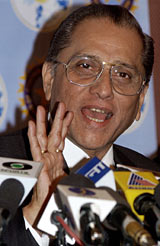An atmosphere of lawlessness
|
|

|
Denness was officiating at the Second Test between South Africa and India at Port Elizabeth when he imposed penalties on six Indian players and incurred the wrath of a nation. It would be unfair to say he brought the game to the brink of schism; others did that, among them Jagmohan Dalmiya, former president of the ICC and, since September 2001, president of the Indian board. When India took umbrage at Denness's penalties and insisted he be removed as referee for the final Test - otherwise the team would go home and take their lucrative television purse with them - the South African board buckled under the threat of lost revenue. Denness was denied access to the Third Test, at Centurion, and the ICC withdrew their imprimatur. For the time being anyway: past experience warns that one should never take any ICC ruling for granted. But as things stand, the match at Centurion does not count as an official Test.
Viewed dispassionately, it was difficult to gauge what grieved the Indians more: the fact that prime among the penalised was Tendulkar, accorded god-like status by his millions of adoring fans, or that Denness, white and British, a former England captain, was a representative of the old colonial power. Accusations of racism, because he took no action against the South Africans' appeals and sledging, muddied the waters further.
Tendulkar (we'll come to the other five) was caught up in the catch-all crime of bringing the game into disrepute, fined 75 per cent of his match fee and given a one-match suspended ban. Denness, watching on television, had caught him interfering with the ball "by himself and without the on-field umpire's supervision under Law 42.3 (a)(ii) and Law 42.3 (b)". The umpires appear not to have noticed anything untoward, and the condition of the ball had not changed sufficiently to attract their attention, or the statutory five-run penalty. In fact, Tendulkar was most likely cleaning the seam and guilty on a technicality at worst. By the time the headline writers had put their slant on it, the crime was ball-tampering and the incendiaries were burning effigies of Denness.
In another year, the matter might have ended with the unofficial Test. But Denness, as well as fining captain Sourav Ganguly, Virender Sehwag, Harbhajan Singh, Deep Dasgupta and Shiv Sunder Das for other breaches of the Code of Conduct, also handed out a one-Test suspension to Sehwag, who had earlier hit a hundred on debut at Bloemfontein. In happier circumstances, that would have been the Centurion match. Now, however, India's next Test, as far as the ICC were concerned, was against England at Mohali in December. India, who had not played Sehwag at Centurion, argued otherwise and a period of brinkmanship followed. The Indian selectors included Sehwag in their squad; the ICC's new chief executive, Malcolm Speed, warned in no uncertain manner that the council would not give the Test official status if he played; the ECB said England would not take part in an unofficial match. For a day or two there was the threat of an international split. One deadline passed but eventually, perhaps inevitably, India accepted Speed's offer to set up a "referees commission" to investigate whether Denness had acted in accordance with the Code of Conduct, the role of referees generally and whether players should have a right of appeal. Given that the ICC executive board had already agreed to strengthen the disciplinary power of referees from April 2002, the commission looked like being about as sabre-toothed as its name.
ICC call the shots
A year or two earlier, the Indians would have headed off the ICC well before the impasse. What this eyeballing emphasised was the confidence with which the new administration had grasped authority, following universal acceptance of recommendations in the Condon Report on cricket corruption. Sir Paul (later Lord) Condon's report was considered by many to be a damp squib. There were no disclosures; no sacrificial names from which to hang headlines. But it did challenge the ICC to put their house in order and, given the context of the report, the member countries had little option but to strengthen the executives' role. For that alone, Condon has influenced the way cricket moves forward. But the stand-off also reminded the cricket world that India, through her cricket-crazy population and television's immense marketing potential, has an economic clout no other country can match. Cricket's old establishment may be undecided whether Dalmiya is a smoking gun or a loose cannon, but he epitomises the progressive, post-imperial, nuclear India. He is both poker player and politician. At the eleventh hour, he knew he couldn't trust his hand against Speed's, but he knew he held the better cards when he wagered an extra India-England one-day international against this summer's Oval Test. It may not have been a gentleman's bet; the ECB had, after all, agreed terms with the pre-Dalmiya administration. But such is the precarious nature of their finances that they could not afford to lose the income the Oval Test would generate. They agreed to the extra one-day game in India (the Indians had initially wanted two), which ironically allowed England to draw the series 3-3.
It is as great an irony that Dalmiya's business acumen, when ICC president, provided the council with the financial muscle to stand up to India. Through television rights to the World Cup and interim knockout tournaments, he showed how cricket could be enriched beyond previous imagination. He may not always have won friends, but he knew how to influence people. He knew, too, how to nurse a grudge, for he had been sorely hurt by the peremptory way the ICC had dropped their pilot once they were in secure waters. When the opportunity came to rock their boat, he was hardly likely to resist it. Dalmiya aside, old attitudes towards India will have to change.

